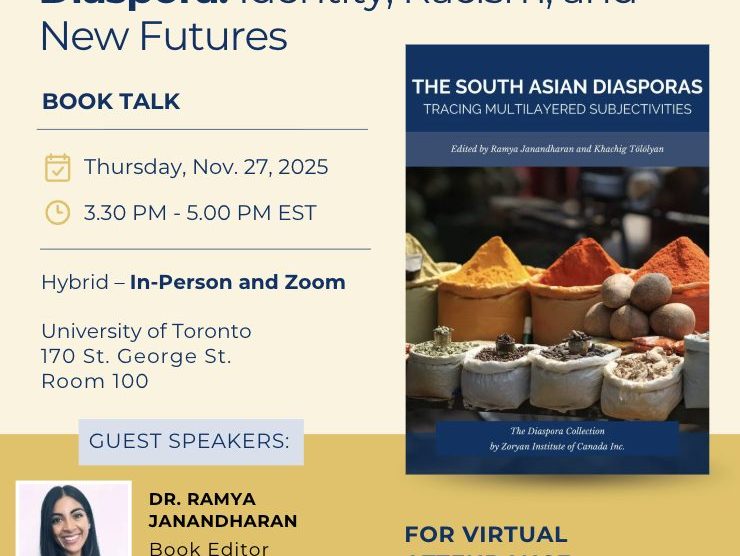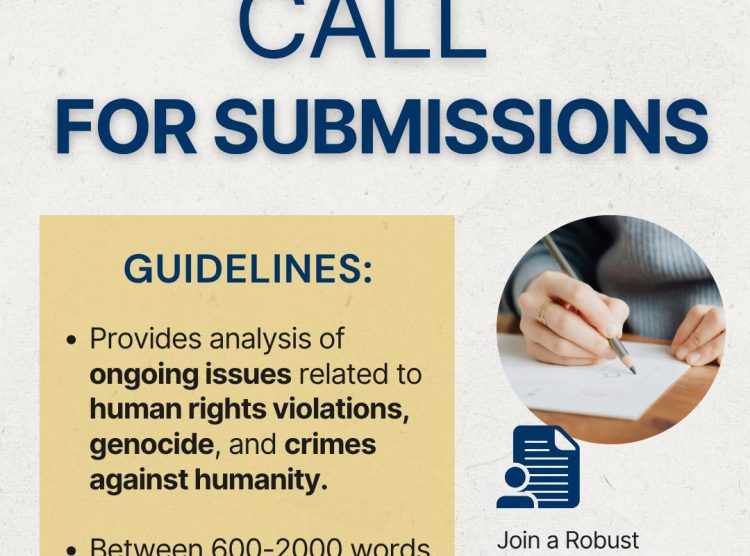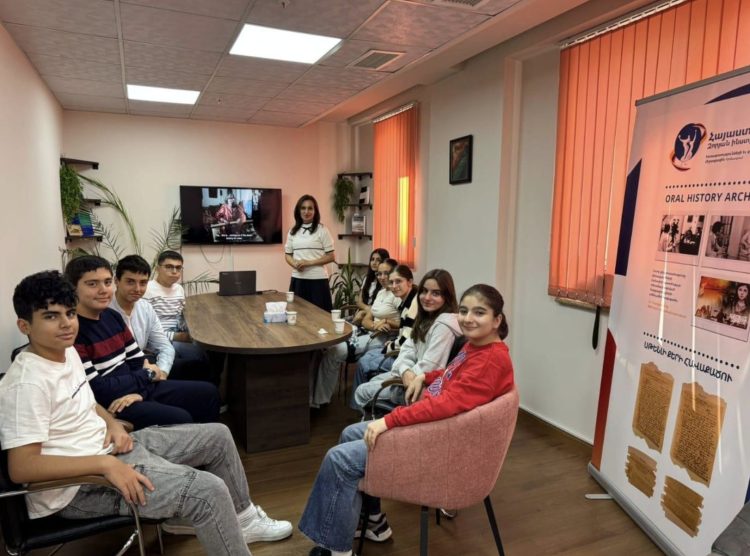TORONTO, ON, October 8, 2025: The New Books in Genocide Studies (NBGS) podcast has released a new episode in collaboration with the Zoryan Institute’s journal Genocide Studies International (GSI), spotlighting the journal’s recent special issue, The Future of Genocide Education (GSI Vol. 16.1).
Hosted by Dr. Kelly McFall, GSI Book Review Editor and Professor at Newman University, this episode features a conversation with two standout contributors to the Future of Genocide Education issue: Dr. Maureen Hiebert, Professor at the Univeristy of Manitoba, and Academic Chair of the Zoryan Institute’s Board of Directors; and Dr. James Waller, Professor at the University of Connecticut, and core faculty at the Zoryan Institute’s annual Genocide and Human Rights University Program (GHRUP) at the University of Toronto.
Together, they reflect on key questions raised in the GSI special issue, including why students should learn about genocide, the intended outcomes of genocide education, and how best to define its value and its impact.
In reflection of this episode’s discussion, host Dr. McFall shared,
 “I was struck by how the lack of clarity around the goals of genocide education has led to a wide range of strategies and learning objectives. There’s a need for the field to reflect more deeply on what we’re trying to achieve and the change we want to see in our students.”
“I was struck by how the lack of clarity around the goals of genocide education has led to a wide range of strategies and learning objectives. There’s a need for the field to reflect more deeply on what we’re trying to achieve and the change we want to see in our students.”
Dr. Hiebert and Dr. Waller note a significant expansion in the scope and visibility of genocide education in recent years. This is evidenced by the growing number of courses, academic departments, and supplementary programs, such as the Zoryan Institute’s GHRUP, that have helped train a new generation of genocide scholars and educators.
However, a much larger concern quickly emerges from this understanding: Has it been effective? Has its value been realized? What do we have to show for it?
To this end, Dr. Waller and Dr. Hiebert discussed the gap between academic knowledge and social change. While scholarship on genocide has grown, it isn’t always accessible or actionable for wider audiences. There is a growing call to bridge this gap by rethinking pedagogy: integrating survivor voices, community-based learning, and approaches that connect historical study with present-day issues of injustice and human rights.
Dr. Hiebert expanded on her concern from her perspective as an educator:
 “We’ve done a good job at educating students about genocide. Where I have some concerns is that while my course in genocide studies always fills up, the people who take it are already self-selecting. They are students who already want to know about the phenomenon for very genuine reasons, and they come to learn more about something they’re already interested in.”
“We’ve done a good job at educating students about genocide. Where I have some concerns is that while my course in genocide studies always fills up, the people who take it are already self-selecting. They are students who already want to know about the phenomenon for very genuine reasons, and they come to learn more about something they’re already interested in.”
She continues, “I’m not so sure how well genocide studies has done attracting students who are less knowledgeable to begin with and less interested … If our goal is to engender greater tolerance, I’m not sure what kind of a job we’re doing.”
With genocidal violence ongoing in many regions, this episode raises timely questions about how we teach mass atrocity and why training genocide scholars matters. The Zoryan Institute maintains that, in order to attract and engage new generations of students, the field must remain relevant by addressing contemporary issues of human rights and atrocities through the lens of the Genocide Convention. Teaching historical cases comparatively is essential to provide context for the Convention; however, genocide studies must also
remain connected to present-day conflicts, where survival, ongoing cycles of violence, and gross human rights violations are all seen and viewed on social media, news, and the internet. This information is no longer hidden; it is visible and widely consumed. Therefore, integrating current issues is key to provoking interest and engaging broader audiences so that more people will be engaged in the urgent efforts of genocide prevention.
Listeners can now stream this episode of the GSI-NBGS partnership, featuring Dr. McFall in conversation with GSI contributors Dr. Maureen Hiebert and Dr. Waller. Tune in now on the NBGS website or on streaming platforms including Spotify, Apple Podcasts, and Amazon Music.
To learn more about GSI, please visit www.zoryaninstitute.org or the University of Toronto Press at https://utppublishing.com/journal/gsi.

 “I was struck by how the lack of clarity around the goals of genocide education has led to a wide range of strategies and learning objectives. There’s a need for the field to reflect more deeply on what we’re trying to achieve and the change we want to see in our students.”
“I was struck by how the lack of clarity around the goals of genocide education has led to a wide range of strategies and learning objectives. There’s a need for the field to reflect more deeply on what we’re trying to achieve and the change we want to see in our students.” “Is what we’re doing in the classroom helping reduce stereotypes, bias, and discrimination?” asks Dr. Waller. “Is it transforming students’ understanding of the world—and their responsibility to it? … I think we have work to do to try and establish the assumptive belief that there’s an inherent value in genocide education.”
“Is what we’re doing in the classroom helping reduce stereotypes, bias, and discrimination?” asks Dr. Waller. “Is it transforming students’ understanding of the world—and their responsibility to it? … I think we have work to do to try and establish the assumptive belief that there’s an inherent value in genocide education.” “We’ve done a good job at educating students about genocide. Where I have some concerns is that while my course in genocide studies always fills up, the people who take it are already self-selecting. They are students who already want to know about the phenomenon for very genuine reasons, and they come to learn more about something they’re already interested in.”
“We’ve done a good job at educating students about genocide. Where I have some concerns is that while my course in genocide studies always fills up, the people who take it are already self-selecting. They are students who already want to know about the phenomenon for very genuine reasons, and they come to learn more about something they’re already interested in.” 


